- Home
- Lauren Oliver
Vanishing Girls Page 2
Vanishing Girls Read online
Page 2
“Please,” I say quickly, before he can finish. “Don’t.”
Dad sighs and rubs his eyes under his glasses. He smells a little bit like the menthol strips he puts on his nose at night to keep him from snoring, and he’s still wearing the baggy pajama pants he’s had forever, the ones with reindeers on them. And just for a second, I feel really, truly terrible.
Then I remember Dad’s new girlfriend and Mom’s silent, taut look, like a dummy with her strings pulled way too tight.
“You’re going to have to talk about it, Nick,” Dad says. This time his voice is quiet, concerned. “If not with me, then with Dr. Lichme. Or Aunt Jackie. Or someone.”
“No,” I say, unrolling the window all the way, so the wind is thunderous and whips away the sound of my voice. “I don’t.”
JANUARY 7
Dara’s Diary Entry
Dr. Lick Me—I’m sorry, Lichme—says I should spend five minutes a day writing about my feelings.
So here I go:
I hate Parker.
I hate Parker.
I hate Parker.
I hate Parker.
I hate Parker.
I feel better already!
It’s been five days since THE KISS and today in school he didn’t even breathe in my direction. Like he was worried I would contaminate his oxygen circle or something.
Mom and Dad are on the shit list this week, too. Dad because he’s acting all serious and somber about the divorce, when inside you know he’s just turning backflips and cartwheels. I mean, if he doesn’t want to leave, he doesn’t have to, right? And Mom because she doesn’t even stand up for herself, and didn’t cry once about Paw-Paw, either, not even at the funeral. She just keeps going through the motions and heading to SoulCycle and researching goddamn quinoa recipes as if she can keep the whole world together just by getting enough fiber. Like she’s some weird animatronic robot wearing yoga pants and a Vassar sweatshirt.
Nick is like that too. It drives me crazy. She didn’t used to be, I don’t think. Maybe I just don’t remember. But ever since she started high school, she’s always doling out advice like she’s forty-five and not exactly eleven months and three days older than I am.
I remember last month, when Mom and Dad sat down to tell us about the divorce, she didn’t even blink. “Okay,” she said.
Oh-fucking-kay. Really?
Paw-Paw’s dead and Mom and Dad hate each other and Nick looks at me like I’m an alien half the time.
Listen, Dr. Lick Me, here’s all I have to say: It’s not okay.
Nothing is.
JULY 17
Nick
Somerville and Main Heights are only twelve miles apart, but they might as well be in different countries. Main Heights is all new: new construction, new storefronts, new clutter, newly divorced dads and their newly bought condos, a small cluster of sheetrock and plywood and fresh paint, like a stage set built too quickly to be realistic. Dad’s condo looks out over a parking lot and a line of skinny elm trees that divides the housing complex from the highway. The floors are carpeted and the air conditioner never makes a sound, just silently churns out frigid, recycled air, so it feels like living inside a refrigerator.
I like Main Heights, though. I like my all-white room, and the smell of new asphalt, and all the flimsy buildings clinging to the sky. Main Heights is a place where people go when they want to forget.
But two days after the skinny-dipping incident, I’m heading home to Somerville.
“It’ll be good for you to get a change of scenery,” Dad says, for the twelfth time, which is stupid because it’s the exact thing he said when I moved out to Main Heights. “And it’ll be good for your mother to have you home. She’ll be happy.”
At least he doesn’t lie and say that Dara will be happy, too.
Too fast, we’re entering Somerville. Just like that, from one side of the underpass to the other, everything looks old. Enormous trees line the road, weeping willows fingering the earth, tall oaks casting the whole car in flickering shadow; through the curtain of swaying green, enormous houses ranging from turn-of-the-century to colonial to who-the-hell-knows-how-long-ago are visible. Somerville used to be the seat of a booming mill and cotton factory, the largest town in the whole state. Now half the town has been granted landmark status. We have a Founders’ Day and a Mill Festival and a Pilgrims’ Parade. There’s something backward about living in a place so obsessed with the past; it’s like everyone’s given up on the idea of a future.
As soon as we turn onto West Haven Court, my chest goes tight. This, too, is the problem with Somerville: too many memories and associations. Everything that happens has happened a thousand times before. For a second, an impression surfaces of a thousand other car rides, a thousand other trips home in Dad’s big Suburban with the rust-colored coffee stain on the passenger seat—a composite memory of family trips and special dinners and group errands.
Funny how things can stay the same forever and then change so quickly.
Dad’s Suburban is now for sale. He’s looking to trade it in for a smaller model, like he traded his big house and four-person family for a downsized condo and a perky, pint-size blonde named Cheryl. And we’ll never drive up to number 37 as a family again.
Dara’s car is in the driveway, boxed in between the garage and Mom’s: the pair of fuzzy dice I bought her at a Walmart still hanging from the rearview, so dirty I can make out handprints near the gas tank. It makes me feel a little better that she hasn’t thrown them away. I wonder if she’s started driving again yet.
I wonder if she’ll be home, sitting in the kitchen alcove, wearing a too-big T-shirt and barely-there shorts, picking her toenails like she always does when she wants to drive me crazy. Whether she’ll look up when I come in, blow the bangs out of her eyes, and say, “Hey, Ninpin,” as if nothing has happened, as if she hasn’t spent the past three months avoiding me completely.
Only once we’re parked does Dad seem sorry for off-loading me.
“You gonna be okay?” he asks.
“What do you think?” I say.
He stops me from getting out of the car. “This will be good for you,” he repeats. “For both of you. Even Dr. Lichme said—”
“Dr. Lichme’s a hack,” I say, and climb out of the car before he can argue. After the accident, Mom and Dad insisted I ramp up my sessions with Dr. Lichme to once a week, like they were worried I’d crashed the car deliberately or maybe that the concussion had permanently screwed up my brain. But they finally stopped insisting I go after I spent a full four sessions at $250 an hour sitting in complete and total silence. I have no idea whether Dara’s still going.
I rap once on the trunk before Dad pops it. He doesn’t even bother getting out of the car to give me a hug, not that I want one—just rolls down his window and lifts his arm to wave, like I’m a passenger on a ship about to set sail.
“I love you,” he says. “I’ll call you tonight.”
“Sure. Me too.” I sling my duffel over one shoulder and start traipsing toward the front door. The grass is overgrown and clings wetly to my ankles. The front door needs painting and the whole house looks deflated, like something integral inside has collapsed.
A few years ago my mom became convinced that the kitchen was slanted. She would line up frozen peas and show Dara and me how they rolled from one end of the counter to the other. Dad thought she was crazy. They got in a big fight about it, especially since he kept stepping on peas whenever he went barefoot to the kitchen for water at night.
It turned out Mom was right. Finally she had someone take a look at the foundation. Because of the way the ground had settled, it turned out our house leaned a half inch to the left—not enough to see, but enough to feel.
But today the house looks more lopsided than ever.
Mom hasn’t yet bothered to switch out the storm door for the screen. I have to lean on the handle before it will open. The hallway is dark and smells faintly sour. Several FedEx boxes are s
tacked underneath the hall table, and there’s a pair of rubber gardening boots I don’t recognize, soles caked with mud, abandoned in the middle of the floor. Perkins, our sixteen-year-old tabby, lets out a plaintive meow and trots down the hall, twining himself around my ankles. At least someone is happy to see me.
“Hello?” I call out, embarrassed that I suddenly feel so awkward and disoriented, as if I’m a stranger.
“In here, Nick!” Mom’s voice sounds faint through the walls, as if it’s trapped there.
I dump my bags in the hall, careful to avoid the mud splatter, and make my way toward the kitchen, the whole time imagining Dara: Dara on the phone, Dara with knees up in the windowsill, Dara with new streaks of color in her hair. Dara’s eyes, clear as pool water, and the small upturned knob of her nose, the kind of nose people pay for. Dara waiting for me, ready to forgive.
But in the kitchen, I find Mom alone. So. Either Dara’s not home, or she has decided not to grace me with her presence.
“Nick.” Mom seems startled when she sees me, though of course she heard me come in and has been expecting me all morning. “You’re too thin,” she says when she hugs me. Then: “I’m very disappointed in you.”
“Yeah.” I take a seat at the table, which is piled high with old newspapers. There are two mugs, both half-filled with coffee now showing a milk-white sheen, and a plate with a piece of half-eaten toast on it. “Dad said.”
“Really, Nick. Skinny-dipping?” She’s trying to pull the disapproving-parent act, but she isn’t as convincing as Dad was, as if she’s an actress and already the lines are boring her. “We’re all dealing with enough as it is. I don’t want to have to worry about you, too.”
There she is, shimmering between us like a mirage: Dara in short-shorts and high heels, lashes thick with mascara, leaving dust on her cheeks; Dara laughing, always laughing, telling us not to worry, she’ll be safe, she never drinks, even as her breath smells like vanilla vodka; Dara the beautiful one, the popular one, the problem child everyone loves—my baby sister.
“So don’t,” I say bluntly.
Mom sighs and takes a seat across from me. She looks like she’s aged a hundred years since the accident. Her skin is chalky and dry, and the bags under her eyes are a bruise-y yellow color. The roots are showing at her scalp. For a second I have the worst, most vicious thought: No wonder Dad left.
But I know that isn’t fair. He left even before things got shitty. I’ve tried to understand it a million times, but still, I can’t. Afterward, sure. When Dara got metal pins in her kneecaps and swore she would never speak to me again, and when Mom went silent for weeks and started taking sleeping pills every night and waking up too groggy to go to work and the hospital bills kept coming, kept coming, like autumn leaves after a storm.
But why weren’t we good enough before?
“Sorry about the mess.” Mom gestures to encompass the table and the window seat, cluttered with mail, and the countertop, also heaped with mail and groceries half unpacked from a bag and then abandoned. “There’s always so much to do. Ever since I started work again . . .”
“That’s okay.” I hate hearing my mom apologize. After the accident, all she did was say I’m sorry. I woke up in the hospital and she was holding me, rocking me like a baby, repeating it over and over. Like she had anything to do with it. Hearing her apologize for something that wasn’t her fault made me feel even worse.
I was the one driving the car.
Mom clears her throat. “Have you thought about what you’ll do this summer, now that you’re home?”
“What do you mean?” I reach over and take a bite of the toast. Stale. I spit it out into a balled-up napkin, and Mom doesn’t even lecture me. “I still have shifts at the Palladium. I’ll just have to borrow Dara’s car and—”
“Absolutely not. No way you’re going back to the Palladium.” Mom turns, suddenly, into her old self: the principal-for-one-of-the-worst-public-high-schools in Shoreline County, the mom who broke up physical fights between the senior boys and made absentee parents get it together, or at least do a better job of pretending. “And you’re not driving, either.”
Anger itches its way up through my skin. “You’re not serious.” At the start of the summer, I landed a job behind the concessions kiosk at the Palladium, the movie theater at Bethel Mall just outside of Main Heights: the world’s easiest, stupidest job. Most days the whole mall is empty except for moms in spandex pushing baby strollers, and even when they come to the Palladium they never order anything but Diet Coke. All I have to do is show up and I get $10.50 an hour.
“I’m dead serious.” Mom folds her hands on the table, her knuckles gripped so tightly I can see every bone. “Your father and I think you need a little more structure this summer,” she says. Amazing that my parents can only find time to stop hating each other to team up against me. “Something to keep you busy.”
Busy. Like stimulated, that word is parent-speak for: supervised at all times and bored out of your mind.
“I’m busy at the Palladium,” I say, which is a complete lie.
“You mix butter into popcorn, Nicki,” Mom says. A crease appears between her eyebrows, as if someone has just pressed a thumb to her skin.
Not always, I nearly say.
She stands up, cinching her bathrobe a little tighter. Mom runs summer-school sessions Monday through Thursday. I guess since it’s Friday she didn’t bother getting dressed, even though it’s after 2:00 p.m. “I’ve spoken to Mr. Wilcox,” she says.
“No.” The itch has become a full-blown panic. Greg Wilcox is a creepy old guy who used to teach math at Mom’s school, until he chucked academia for a job managing the world’s oldest, most pathetic amusement park, Fantasy Land. Since the name makes it sound like a strip club, everyone calls it FanLand. “Don’t even say it.”
Apparently she isn’t listening. “Greg said he’s short-staffed this summer, especially after—” She breaks off, making a face as if she’s sucking on a lemon, meaning she almost said something she shouldn’t have. “Well, he could use an extra pair of hands. It’ll be physical, it’ll get you outside, and it will be good for you.”
I’m getting pretty sick of my parents forcing me to do things while pretending it’s for my benefit.
“This isn’t fair,” I say. I almost add, You never make Dara do anything, but I refuse to mention her, just like I refuse to ask where she is. If she’s going to pretend I don’t exist, I can do the same for her.
“I don’t have to be fair,” she says. “I’m your mom. Besides, Dr. Lichme thinks—”
“I don’t care what Dr. Lichme thinks.” I shove away from the table so hard the chair screeches on the linoleum. The air in the house is thick with heat and moisture: no central air. This is what my summer will be like: instead of lying in Dad’s spare bedroom with the AC cranked up and all the lights off, I’ll be sharing a house with a sister who hates me and slaving away at an ancient amusement park solely attended by freaks and old people.
“Now you’re starting to sound like her, too.” Mom looks totally exhausted. “One is enough, don’t you think?”
It’s typical of Dara that she can become not only the topic of but also a force in the conversation even when she isn’t in the room. For as long as I can remember, people have been comparing me to Dara instead of the other way around. She’s not as pretty as her younger sister . . . shyer than her younger sister . . . not as popular as her younger sister . . .
The only thing I was ever better at than Dara was being ordinary. And field hockey—like running a ball down a field is a great basis for a personality.
“I’m nothing like her,” I say. I leave the kitchen before Mom can respond, almost tripping on the stupid gardening boots in the hall before taking the stairs two at a time. Everywhere are signs of the unfamiliar, little details missing and others added, like several plastic gnome-shaped night-lights outside Mom’s room and nothing but a bare patch of carpet in the office where Dad’s favorite,
ugly-ass leather chair used to sit, plus more and more cardboard boxes full of junk, as if another family is slowly moving in or we’re slowly moving out.
My room, at least, is untouched: all the books organized spine-out and the powder-blue coverlet nicely folded and my stuffed animals from when I was a baby, Benny and Stuart, propped up on my pillows. On my bedside table, I spot the framed picture of Dara and me from Halloween when I was a freshman; in it, we’re both dressed like scary clowns, and in our face paint, grinning, we look nearly identical. I cross the room quickly and turn the picture facedown. Then, thinking better of it, I slide the photograph into a drawer.
I don’t know which is worse: that I’m home and so much is different, or that I’m home and so much feels the same.
Overhead, I hear a pattern of creaks. Dara, moving around her attic bedroom. So she is home. Suddenly I’m so angry I could hit something. This is all Dara’s fault. Dara’s the one who decided to stop speaking to me. It’s Dara’s fault I’ve been walking around feeling like I’ve got a bowling ball in my chest, like at any second it might drop straight through my stomach and spill my guts on the floor. It’s her fault I can’t sleep, I can’t eat, and when I do I just feel nauseous.
Once upon a time, we would have laughed together about Dad’s girlfriend, and Dara would have made up a mean code name so we could refer to her without her knowing. Once upon a time, she might have come to work with me at FanLand just to keep me company, just so I wouldn’t have to deal with scrubbing out old-person smell and little-kid vomit from the ancient rides all by myself, and we would have competed over who could spot the most fanny packs in an hour or drink the most Coke without barfing.
Once upon a time, she would have made it fun.
Before I’ve fully decided what I’m going to say to her, I head back into the hall and up the attic stairs. The air is even hotter up here. Mom and Dad moved Dara from the ground-floor bedroom to the attic in the middle of freshman year, thinking it would be harder for her to sneak out at night. Instead she started climbing out the window and using the old rose trellis as her own personal ladder.

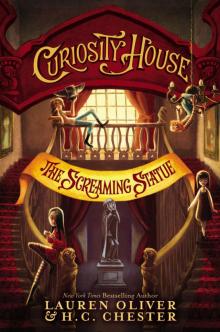 The Screaming Statue
The Screaming Statue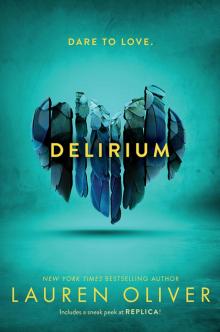 Delirium
Delirium Before I Fall
Before I Fall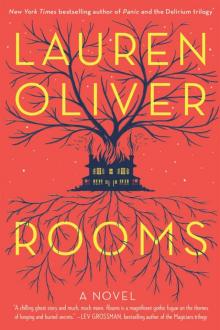 Rooms
Rooms Replica
Replica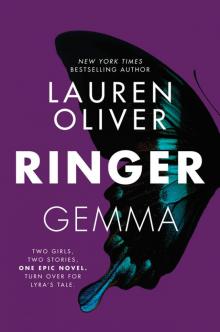 Ringer
Ringer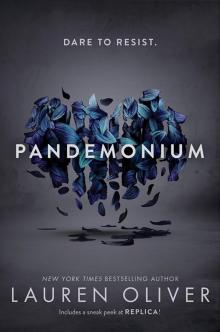 Pandemonium
Pandemonium The Shrunken Head
The Shrunken Head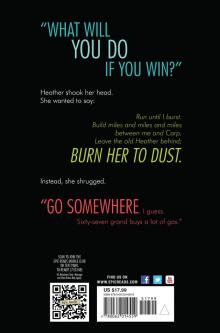 Panic
Panic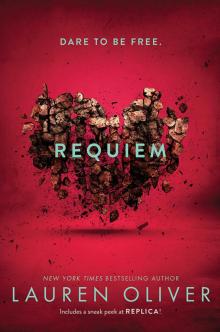 Requiem
Requiem The Spindlers
The Spindlers Annabel
Annabel Liesl & Po
Liesl & Po Raven
Raven Alex
Alex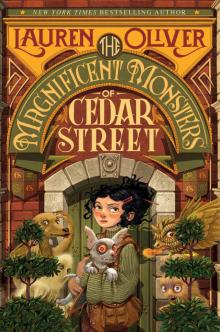 The Magnificent Monsters of Cedar Street
The Magnificent Monsters of Cedar Street Vanishing Girls
Vanishing Girls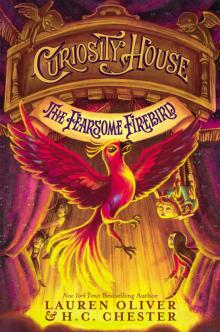 The Fearsome Firebird
The Fearsome Firebird Raven: A Delirium Short Story
Raven: A Delirium Short Story Annabel: A Delirium Short Story
Annabel: A Delirium Short Story Hana: A Delirium Short Story
Hana: A Delirium Short Story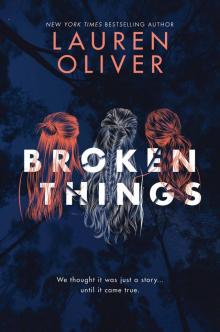 Broken Things
Broken Things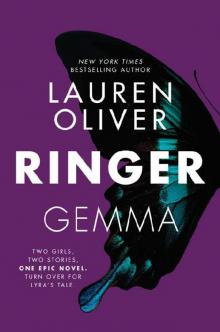 Ringer (Replica)
Ringer (Replica) Alex (delirium)
Alex (delirium)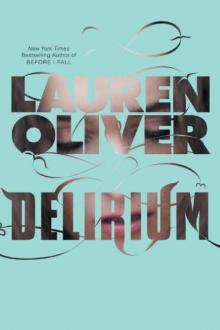 Delirium dt-1
Delirium dt-1